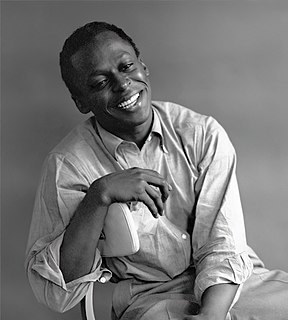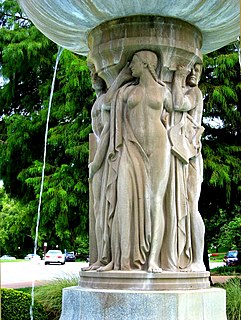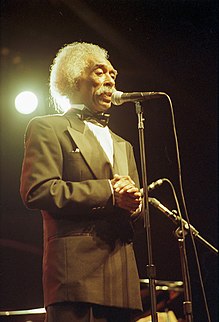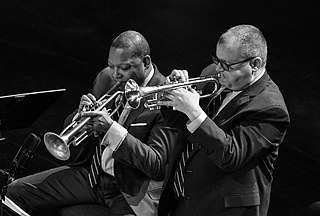Sources
- So What: The Life of Miles Davis by John Szwed (Simon & Schuster, 2002)
- Milestones: The Music and Times of Miles Davies by J.K. Chambers (Da Capo Press, 1998)
- Miles Davis: The Autobiography
- Clark Terry: Having Fun from All About Jazz.
Elwood C. Buchanan Sr. | |
|---|---|
| Birth name | Elwood C. Buchanan Sr. |
| Born | January 26, 1907 St. Louis, Missouri, United States |
| Died | May 21, 1990 (aged 83) Saint Clair County, Illinois, United States |
| Genres | Jazz |
| Occupation(s) | Teacher, trumpeter |
| Instruments | Trumpet |
Elwood C. Buchanan, Sr (1907-1990) was an American jazz trumpeter and teacher who became an early mentor of Miles Davis.
Buchanan was born in St Louis, Missouri on January 26, 1907, and was trained in music by Joseph Gustat, the principal trumpeter with the St Louis Symphony Orchestra. He began his career playing in local dance bands, including Andy Kirk's orchestra, and on the riverboats that travelled on the Mississippi River between St Louis and New Orleans. During the late 1930s and early 1940s, he taught music and directed the band at Lincoln High School in East St Louis, and also visited the local elementary schools to give weekly lessons. Buchanan was known for his strict and demanding teaching style, and for encouraging pupils to compete with one another.
Buchanan was a patient of Miles Davis's father, who told him of his son's interest in music. Although Davis, at thirteen, was then too young to attend Buchanan's school, Buchanan began giving him private lessons. Davis joined the school band when he began attending Lincoln. Although Buchanan had the band play mainly marches rather than jazz, the techniques he taught profoundly affected Davis' jazz style. In particular, Buchanan went against the times by recommending to his students that they play without vibrato, and is said to have broken Davis of the habit by rapping his knuckles with a ruler and commanding: "Stop shakin' that note. You're going to shake enough when you get old". Buchanan also encouraged Davis to study the lean, relaxed playing of Bobby Hackett (then little known beyond the East Coast) and Harold Shorty Baker. In this, too, Buchanan went against fashion; the most popular trumpeter of the day was Louis Armstrong, whose hot playing style was very different from those of Hackett or Baker.
Davis later credited Buchanan with persuading his parents to buy him a new trumpet, rather than a violin as his mother had preferred. Buchanan also introduced Davis to Clark Terry, who would become his recording partner.
In his autobiography, Davis recalled: "Mr. Buchanan was the biggest influence on my life up until then. He was definitely the person who took me all the way into music at that time."

The flugelhorn, also spelled fluegelhorn, flugel horn, or flügelhorn, is a brass instrument that resembles the trumpet and cornet but has a wider, more conical bore. Like trumpets and cornets, most flugelhorns are pitched in B♭. It is a type of valved bugle, developed in Germany in the early 19th century from a traditional English valveless bugle. The first version of a valved bugle was sold by Heinrich Stölzel in Berlin in 1828. The valved bugle provided Adolphe Sax with the inspiration for his B♭ soprano (contralto) saxhorns, on which the modern-day flugelhorn is modeled.

Louis Daniel Armstrong, nicknamed "Satchmo", "Satch", and "Pops", was an American trumpeter and vocalist. He is among the most influential figures in jazz. His career spanned five decades and different eras in the history of jazz.

Miles Dewey Davis III was an American trumpeter, bandleader, and composer. He is among the most influential and acclaimed figures in the history of jazz and 20th-century music. Davis adopted a variety of musical directions in a five-decade career that kept him at the forefront of many major stylistic developments in jazz.

Leon Bismark "Bix" Beiderbecke was an American jazz cornetist, pianist and composer.

J.J. Johnson, born James Louis Johnson and also known as Jay Jay Johnson, was an American jazz trombonist, composer and arranger.

Wynton Learson Marsalis is an American trumpeter, composer, teacher, and artistic director of Jazz at Lincoln Center. He has promoted classical and jazz music, often to young audiences. Marsalis has won nine Grammy Awards, and his Blood on the Fields was the first jazz composition to win the Pulitzer Prize for Music. He is the only musician to win a Grammy Award in both jazz and classical during the same year.

Bennett Lester Carter was an American jazz saxophonist, clarinetist, trumpeter, composer, arranger, and bandleader. With Johnny Hodges, he was a pioneer on the alto saxophone. From the beginning of his career in the 1920s, he worked as an arranger including written charts for Fletcher Henderson's big band that shaped the swing style. He had an unusually long career that lasted into the 1990s. During the 1980s and '90s, he was nominated for eight Grammy Awards, which included receiving a Lifetime Achievement Award.

Clark Virgil Terry Jr. was an American swing and bebop trumpeter, a pioneer of the flugelhorn in jazz, and a composer and educator.

The U.S. state of Missouri has a storied musical history. It has been the scene of major developments in several popular music genres as well as the birthplace of many notable musicians. St. Louis was an important venue for early blues and jazz, as well as country and bluegrass. Kansas City is home to famous performers such as Charlie Parker, Count Basie, Lester Young, and its own distinct jazz style. Ragtime got its influential hold in the city of Sedalia, Missouri, thanks to Scott Joplin and his publisher John Stark, and through another Missouri native, James Scott.

Gerald Joseph Mulligan, also known as Jeru, was an American jazz saxophonist, clarinetist, composer and arranger. Though primarily known as one of the leading jazz baritone saxophonists—playing the instrument with a light and airy tone in the era of cool jazz—Mulligan was also a significant arranger, working with Claude Thornhill, Miles Davis, Stan Kenton, and others. His pianoless quartet of the early 1950s with trumpeter Chet Baker is still regarded as one of the best cool jazz groups. Mulligan was also a skilled pianist and played several other reed instruments. Several of his compositions, such as "Walkin' Shoes" and "Five Brothers", have become standards.

Harry "Sweets" Edison was an American jazz trumpeter and a member of the Count Basie Orchestra. His greatest impact was as a Hollywood studio musician, whose muted trumpet can be heard backing singers, most notably Frank Sinatra.

David Nathaniel Baker Jr. was an American jazz composer, conductor, and musician from Indianapolis, as well as a professor of jazz studies at the Indiana University Jacobs School of Music. Baker is best known as an educator and founder of the jazz studies program. From 1991 to 2012, he was conductor and musical and artistic director for the Smithsonian Jazz Masterworks Orchestra. He has more than 65 recordings, 70 books, and 400 articles to his credit.

James Edward Heath, nicknamed Little Bird, was an American jazz saxophonist, composer, arranger, and big band leader. He was the brother of bassist Percy Heath and drummer Albert Heath.

Jazz at Lincoln Center is part of Lincoln Center in New York City. The organization was founded in 1987 and opened at Time Warner Center in October 2004. Wynton Marsalis is the artistic director and the leader of the Jazz at Lincoln Center Orchestra.

Wallace Roney was an American jazz trumpeter.

George Edward Coleman is an American jazz saxophonist known for his work with Miles Davis and Herbie Hancock in the 1960s. In 2015, he was named an NEA Jazz Master.

Gerald Stanley Wilson was an American jazz trumpeter, big band bandleader, composer, arranger, and educator. Born in Mississippi, he was based in Los Angeles from the early 1940s. In addition to being a band leader, Wilson wrote arrangements for Duke Ellington, Sarah Vaughan, Ray Charles, Julie London, Dizzy Gillespie, Ella Fitzgerald, Benny Carter, Lionel Hampton, Billie Holiday, Dinah Washington, and Nancy Wilson.

Lewis Michael Soloff was an American jazz trumpeter, composer, and actor.

Ryan Kisor is an American jazz trumpeter.
George Edward "Butch" Ballard was an American jazz drummer who played with Louis Armstrong, Count Basie, and Duke Ellington.